"The Arts Are Like An External Immune System"
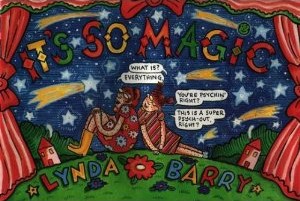
“The fastest way I can explain it is that there is this brilliant neuroscientist named V. S. Ramachandran, who wrote a book called Phantoms in the Brain. He was very interested in people with phantom-limb pain, and he had one patient who had lost his hand from the wrist down, but the guy’s sensation was not only that the hand was still there, but that it was in a painful fist that kept clenching. Ramachandran built a box, with a mirror and two holes in one side. When the guy put his arms in, he saw the one hand reflected. When he opened the hand, he saw it open and it was like the missing hand was unclenching. It fixed his phantom-limb sensation. That’s what I think images do; that’s what the arts do. In the course of human life we have a million phantom-limb pains — losing a parent when you’re little, being in a war, even something as dumb as having a mean teacher — and seeing it somehow reflected, whether it’s in our own work or listening to a song, is a way to deal with it.”
— This interview with the great Lynda Barry is, sadly, all too brief, but you take what you can get. Because, c’mon, it’s Lynda Barry.
It's Cold And Stuff
It may sound hard to believe after yesterday’s balmy monsoon, but it is actually kind of chilly out there this morning. If you’re headed out, grab a scarf.
Banks, from the Outside
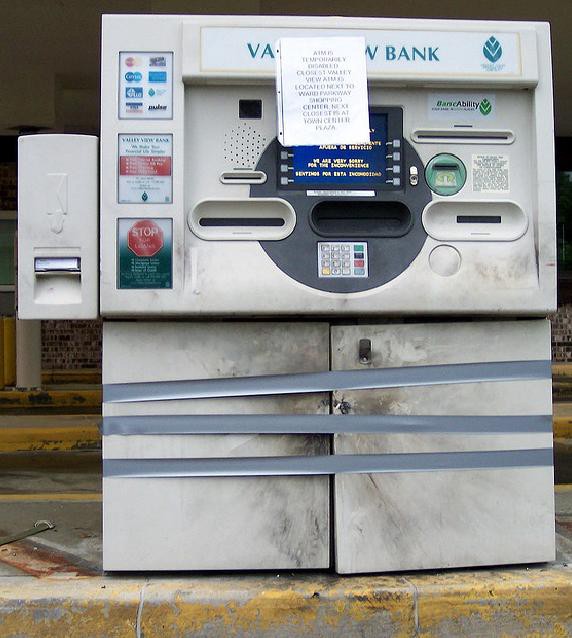
The Banks are in the news constantly these days, and not in a way that is pleasing to The Banks. I suppose this has been the case for some time, thanks to the financial near-Armageddon that almost validated Y2K anxiety eight years late, followed by TARP bailouts coupled with very unpopular executive bonus structures and general nose-thumbing, then followed by our latest situation. It looks even worse for The Banks now, or at least it does if you read Yves Smith and Moe Tkacik, who will get you up to date on the Foreclosure Crisis that has yet to have been given a snappy name, which now looms in ways that remind you of the opening acts of the Great Recession.
So as long as it’s open season on The Banks, now seems like an opportune time to revisit an original complaint against The Banks, that has to do with how we personally interact with The Banks and not with macroeconomics: ATM fees.
ATM fees will not be collapsing the global economy anytime soon — though who knows what we’ll learn in the Great Bank of America Wikileaks Dump of 2011! — but they are a pain in the Aunt Petunia which you yourself have certainly complained about, and as such, useful to examine as a symptom of the evil that The Banks may or may not be doing.
Evil is a strong word, of course, and I mean it in the gentlest sense of conversational exaggeration, because evil is not an easy thing to quantify without tripping over Godwin’s Law. But it is hard to avoid the feeling that The Banks are a single sentient enormous creature, nowhere but everywhere at once, that we can attribute motive to. In the right light, The Banks are The Man. I’m not assuming that this is actually the case. As a gesture of good faith, this will be the only sentence containing the word usury. The Banks are a business, like any other, and they are not in business to make friends.
ATM fees, the amorphous blob we rail against, actually come in three flavors. The first is the fee that your own bank charges you to use that bank’s ATMs. Not all banks do it, but it still happens. The second is the fee that your bank charges you to use an ATM that is owned by another bank, or some other third party. The third is the fee that the owner of an ATM, which owner is not your own bank, charges you. This one is the one that gets noticed because it’s not buried on your statement, but listed on a well-worn sticker on the ATM, and on the screen you click through notifying you that the transaction will cost you $3.00, or more if you are at a gambling establishment or strip club. (There are related fees, as well: for instance, the scheme behind debit overdraft fees — but those fees are avoidable by means of not running out of money, which is nice when it can be managed.)
That’s how it works. Nothing egregious on its face, just a fixed charge for a service, or at least for the convenience of a service. Well, not a charge so much, but a surcharge. Your institution is already charging (or waiving, in some cases, for large average balances) a maintenance fee for your account. If you enter the bank, stand in line and hand a nice teller a slip of paper, you do not get charged a surcharge. A human being, vastly less efficient and more expensive to maintain, is not convenient to the customer, while a robot that can spit out bills in seconds and never calls in sick or demands vacations is very convenient, and so the customer will be charged extra for the robot.
This is why phone, ATM and Internet banking was created. The real cost to banks in transactions is human labor cost. By using ATMs (and the Internet, etc.), these systems are actually saving the banks money.
So the logical next step in that money-saving is making the ATMs make money. According to a study conducted by Bankrate, last year the average fee charged by your own bank to access a non-native ATM was $1.32, and the average fee charged by a third-party ATM owner was $2.22. That’s $3.50 total. On a withdrawal of a couple hundred bucks, it’s a negligible fee. But if, say, you’re pinching pennies, waiting for a check, and only pulling out $40, all of a sudden that comes out to be a 8.75% fee, which seems to be an awful lot for the privilege of accessing your own money.
So when we complain, it’s not a complaint that a fee is being charged at all, as tempting as that may be. Nobody is against profit (well, most people are not). It’s the principle by which we live our lives: put something in and then get something back, and it’s as inescapable as broken hearts and unintended consequences. But the profit being taken by The Banks, in certain circumstances, is unreasonable. If there was a consumer savings account that offered an interest rate of even half of 8.75%, then the egregiousness of The Banks would be lessened. This is not the case.
The Banks are well aware of how this might be seen as unmitigated gall, or even gall mildly mitigated, and is trying to head it off at the pass — see for example this American Bankers Association summary of defenses, which all invoke convenience for the end-user. Unfortunately, the defenses are not exactly calming. Yes, an increase in fees has created an explosion of conveniently-placed ATMs, but is this convenience significant enough to excuse steep surcharges? We are not all Griffin Dunne in After Hours. Sometimes, it’s well before the middle of the night and we’d just like a couple Yuppie food stamps.
And there is an implicit threat in the ABA publicity (“It’d be a shame if anything happened to that convenience you enjoy…”), but I’d like to give the benefit of the doubt and assume it’s unintentional, or at least purposefully vague, as the heart of these defenses is that it’s not fair to take away a business practice that already exists. This business practice is decades old, and the time to call foul passed long ago. It is ingrained into revenue projections and all the other dirty-fingernail aspects of running a country-sized business. For us the little people to ask for the practice to be modified is one thing, but business practice is now calcified into a revenue stream and therefore inviolable. To willingly give up (or even lessen) ATM fees would be contrary to sound business principles — i.e., increase revenue and decrease expenses.
To excuse The Banks is counter-intuitive, but remember that we’re coming from an entirely different context. The Banks are not people with some compunction to do the right thing, and they should not be mistaken as such. They are business entities, organized or incorporated according to the laws of the state of their creation. The core legal precept behind business entities is the concept of limited liability — that the shareholders, directors, officers, etc. are not personally liable for the behavior of the entity except in cases of screaming criminal incompetence. It begs the question of corporate ethics, as the flesh and bloods pulling the levers have limited consequence for the actions of the business entity they own and/or are employed by. That is the intent behind the laws that govern business entities. This is a nutshell version, certainly, but were a corporate decision-maker ever to say, “We can’t do this, it’s just not right!” they would be fired or subject to a shareholder suit. When it comes to corporate governance, moral questions are not for flesh and bloods to speak on unless they rise to criminal level. So it is unreasonable to expect the banking industry to respond to a feeble outcry of consumers about some fee or other not being fair with anything other than a straight-faced justification of the fee and an absolute inability to even conceive of the idea of fairness.
Which brings us to futility, which is not only an undercurrent of this issue, but also of now. The Banks do not have to pull strings behind the curtain. The Banks gave up on the curtain years ago. Either you want to have a bank account, in which case you will be doing business with The Banks, or you elect not to, and pay even more onerous fees from an array of terrifying check-cashing joints. The Banks don’t have a market share, they have the market. They are unavoidable. And the concept that we as mere citizens have some sway, have any say at all, is a signal that is losing coherence. With The Banks, with anything.
But despair aside, the evil The Banks may or may not be doing? The answer to that question is that it’s the wrong question — evil doesn’t apply here any more than the laws of physics do. And to persist to apply a broad-brush label like “evil” is a distraction — is the weather evil for occasionally raining on parades?
But this is a smoke/fire issue. If an unavoidable industry acts continuously in a fashion that makes a sensible person wonder if they are being exploited in more than the MBA sense of exploitation, then maybe there is some there there. And even though The Banks have shown exactly no indication that they intend to govern themselves accordingly, that’s no reason for sensible persons to not talk about this more, and persistently.
Brent Cox is all over the Internet.
Photo by Patrick Hawks from Flickr.
Ten Days in Haiti: A Photo Diary
by Stephen Kosloff
Awl Occasional Contributing Photographer Stephen Kosloff was in Haiti from November 20 to November 30 to take pictures of the cholera epidemic and national elections, which were held on November 28. Here are 26 of his shots.
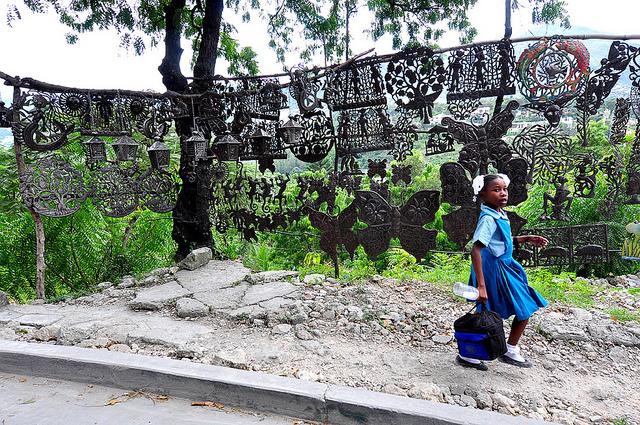
A Haitian student walking home through Petionville, in Port au Prince.
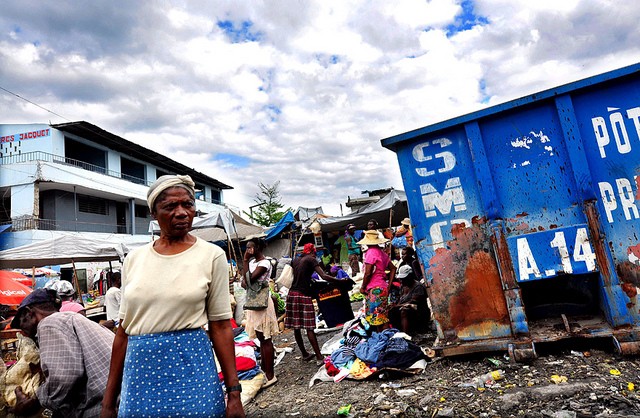
Woman in a marketplace in Petionville section of Port au Prince.
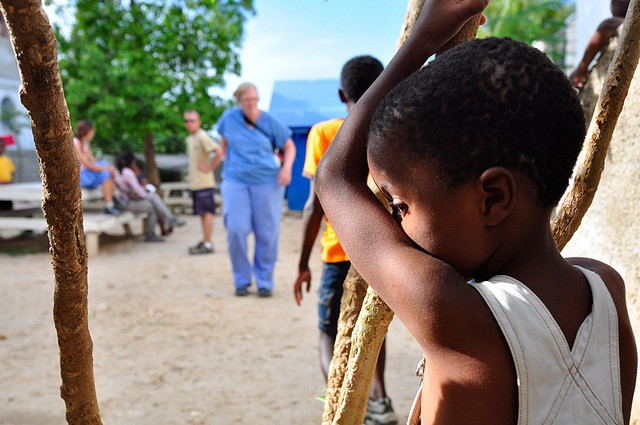
Volunteers with the Materials Management Relief Corps (www.mmrc-us.org/), an NGO based in Port au Prince, play soccer with orphans at an orphanage near Port au Prince.
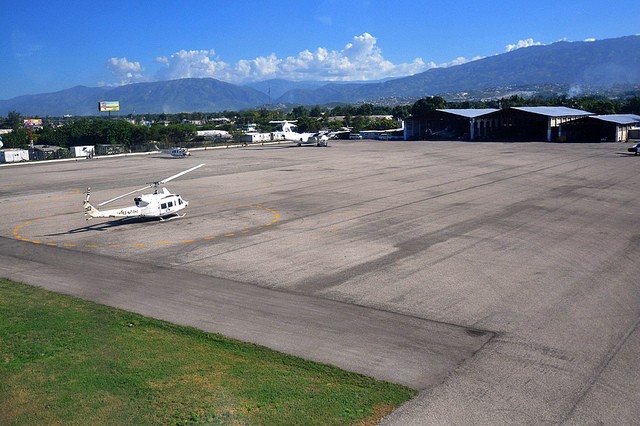
The U.N. airbase adjacent to Toussaint Louverture Airport.
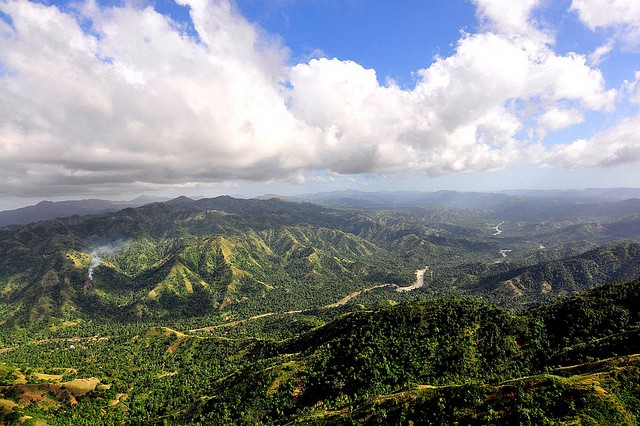
En route to Saint Louis du Nord in the north of Haiti.

En route to Saint Louis du Nord in the north of Haiti.
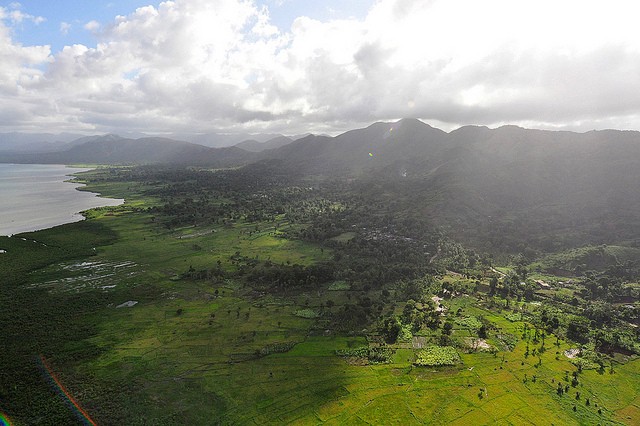
En route to Saint Louis du Nord in the north of Haiti.
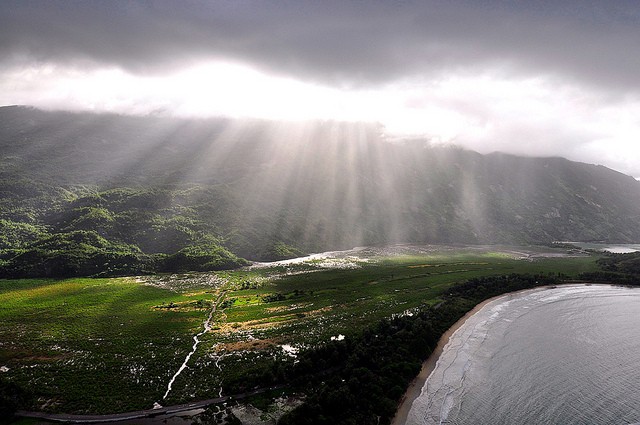
The northern coast of Haiti, in the vicinity of St. Louis du Nord.
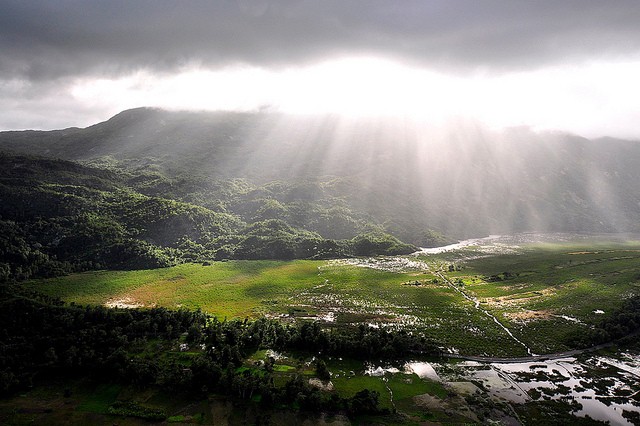
En route to Saint Louis du Nord in the north of Haiti.

The northern coast of Haiti, near St. Louis du Nord.
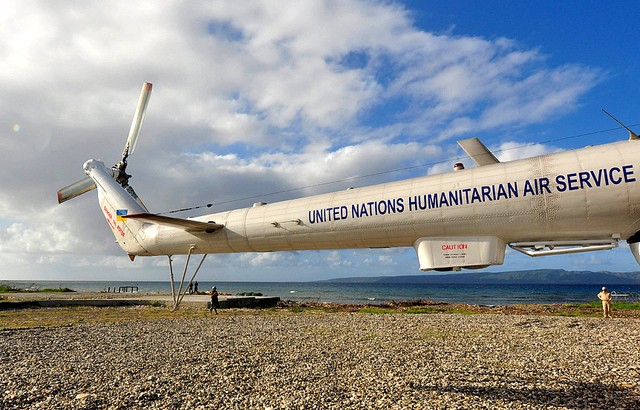
The UN airbase in St. Louis du Nord, northern Haiti.
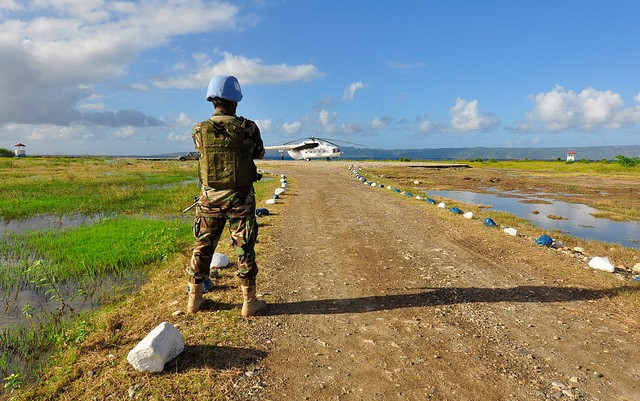
An Argentinian soldier stands guard at the UN airbase in St. Louis du Nord, northern Haiti.
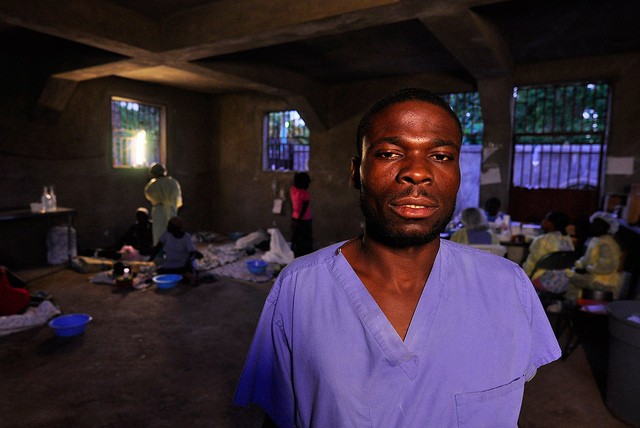
A staff member and translator at a cholera clinic run by the Northwest Haiti Christian Mission, near St. Louis du Nord.
Next: The election.
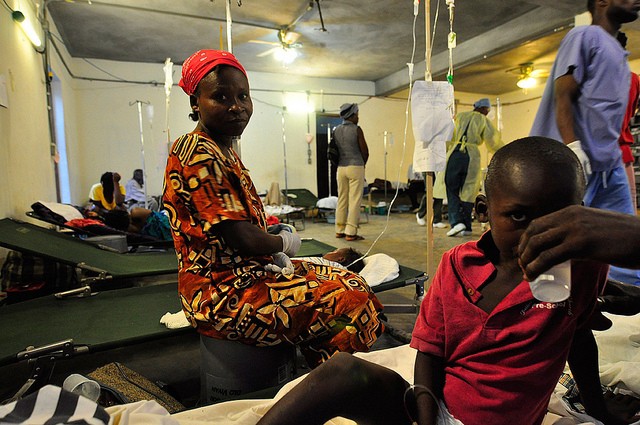
A young cholera patient drinks water as his mother looks on at the Northwest Haiti Christian Mission cholera clinic, near St. Louis du Nord in northern Haiti.
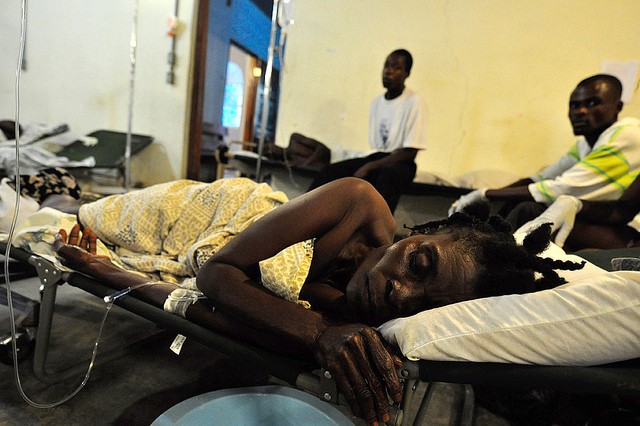
A cholera patient is rehydrated with an IV at the Northwest Haiti Christian Mission cholera clinic, near St. Louis du Nord in northern Haiti.
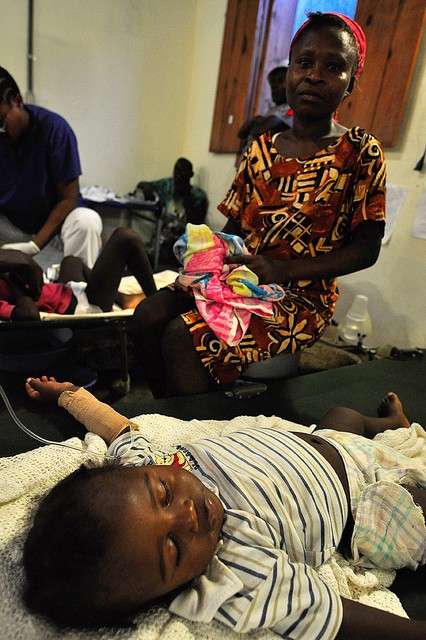
A young cholera patient rests as his mother looks on at the Northwest Haiti Christian Mission cholera clinic, near St. Louis du Nord in northern Haiti.
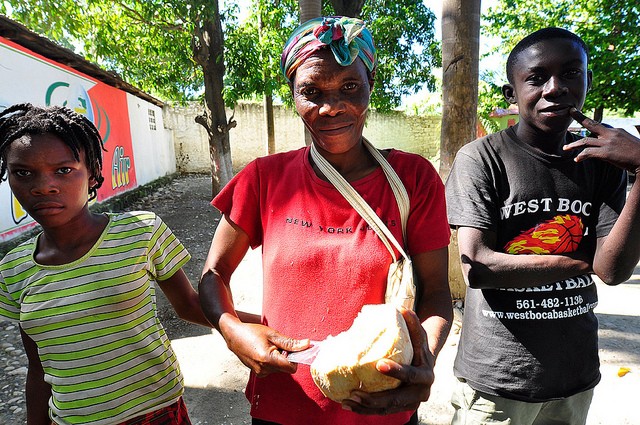
A woman and her family selling coconuts at the airport in Port de Paix, in northern Haiti.
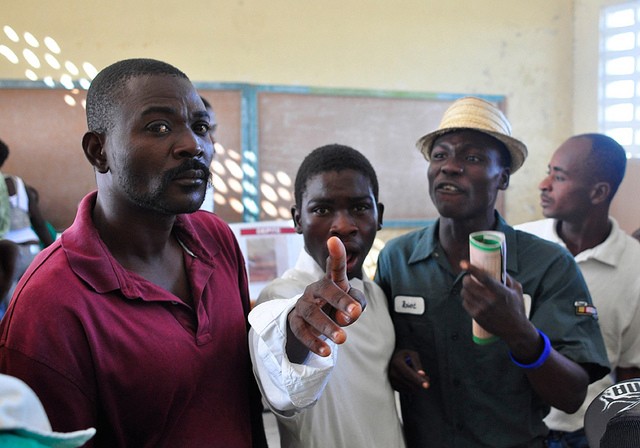
The two men in the center wandered from room to room in the polling station in Cite du Soleil on November 28, election day, in Port au Prince shouting and attempting to disrupt the polling. They were eventually cuffed by police.
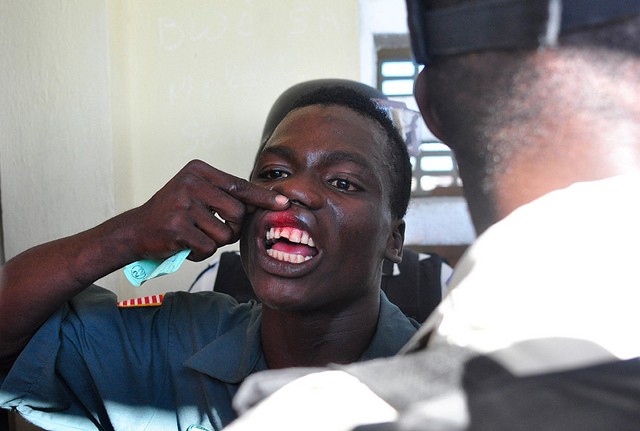
A man shows his bloodied mouth to a policeman after an altercation at the polling station in Cite du Soleil on November 28, election day, in Port au Prince.
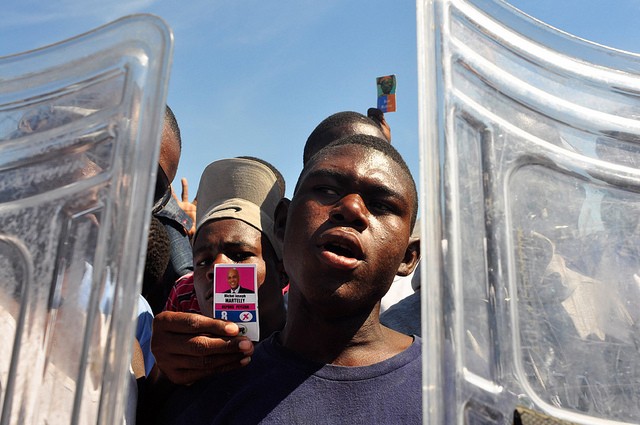
Supporters of Haitian presidential candidate Michel Martelly confront Italian U.N. troops on election day at a U.N. facility in Cite du Soleil, Port au Prince. As of December 1, it appears as though Martelly, who’s also a bona fide rock star in Haiti, is one of the two front-runners in the race, although results are not final, and a run-off is likely.
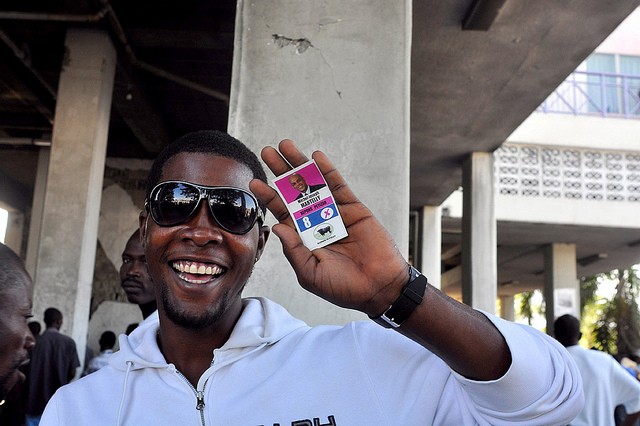
A Haitian supporter of presidential candidate Michel Martelly at the Aviacion polling station in Port au Prince. The polling station was located in a multiple story housing project that was still occupied despite showing large cracks in its walls from the earthquake. As of December 1, it appears as though Martelly, who’s also a bona fide rock star in Haiti, is one of the two front-runners in the race, although results are not final and a run-off is likely.
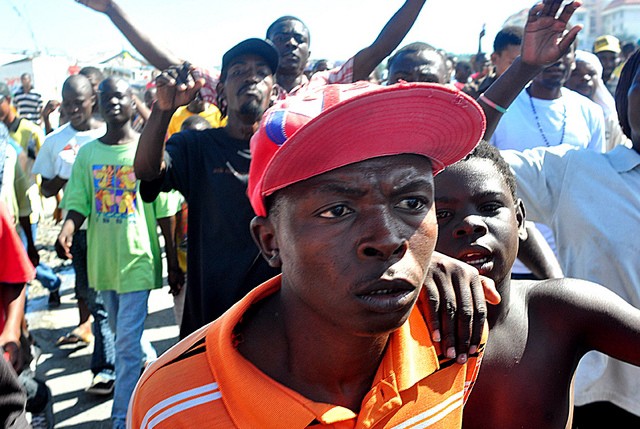
Supporters of presidential candidate Michel Martelly march on election day near the polling station at Aviacion, Port au Prince. As of December 1, it appears as though Martelly, who’s also a bona fide rock star in Haiti, is one of the two front-runners in the race, although results are not final and a run-off is likely.
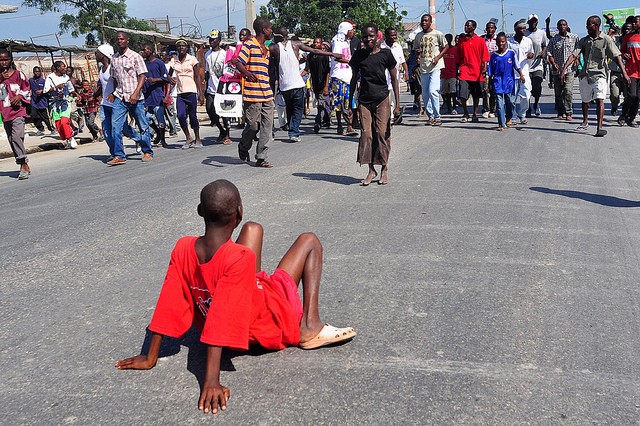
Haitian children playfully lie in the street ahead of a march for presidential candidate Michel Martelly on election day in Port au Prince. As of December 1, it appears as though Martelly, who’s also a bona fide rock star in Haiti, is one of the two front-runners in the race, although results are not final and a run-off is likely.
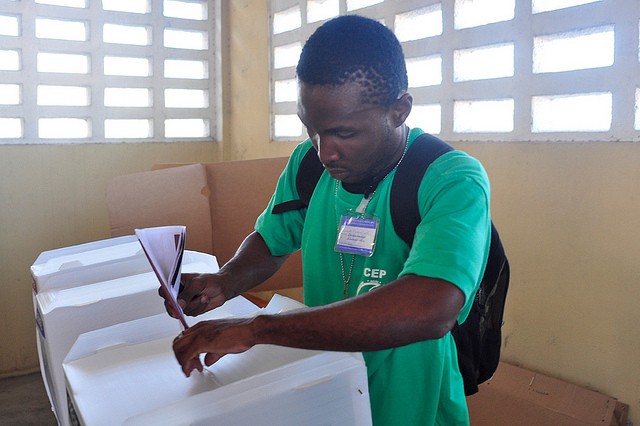
An election worker prepares a ballot box in the Cite du Soleil polling place in Port au Prince on election day.
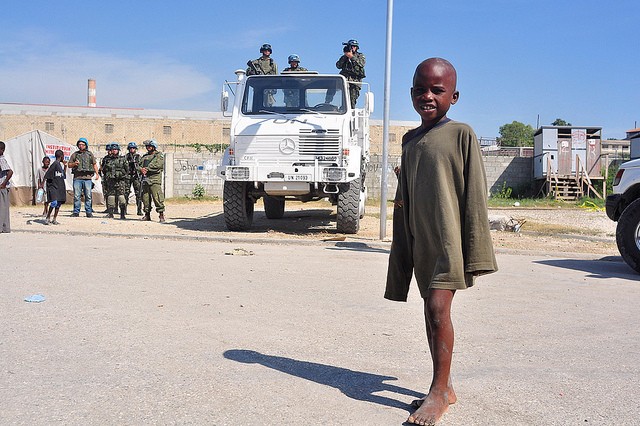
A child looks on as supporters of Haitian presidential candidate Michel Martelly confront Italian U.N. soldiers at a U.N. facility in the Cite du Soleil section of Port au Prince. It was not clear if the child was a fan of Martelly or was merely posing.
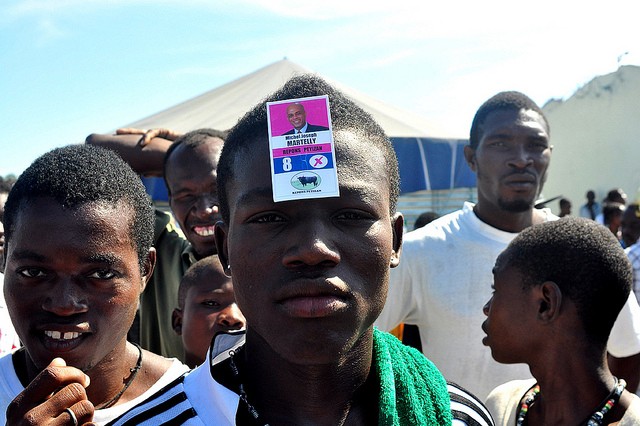
Supporters of Haitian presidential candidate Michel Martelly confront Italian U.N. troops on election day at a U.N. facility in Cite du Soleil, Port au Prince. As of December 1, it appears as though Martelly, who’s also a bona fide rock star in Haiti, is one of the two front-runners in the race, although results are not final and a run-off is likely.
Stephen Kosloff is a freelance photographer and writer based in Greenpoint, Brooklyn. He will be selling prints of these photographs (or any of his work that you fancy) and donating all of the proceeds to MMRC, an NGO that provides logistical support to aid groups in Haiti. You can reach him through his website, if you’re interested in snapping up some photos, as Christmas presents, for example.
Ball Lightning, UFOs And Other Mysteries
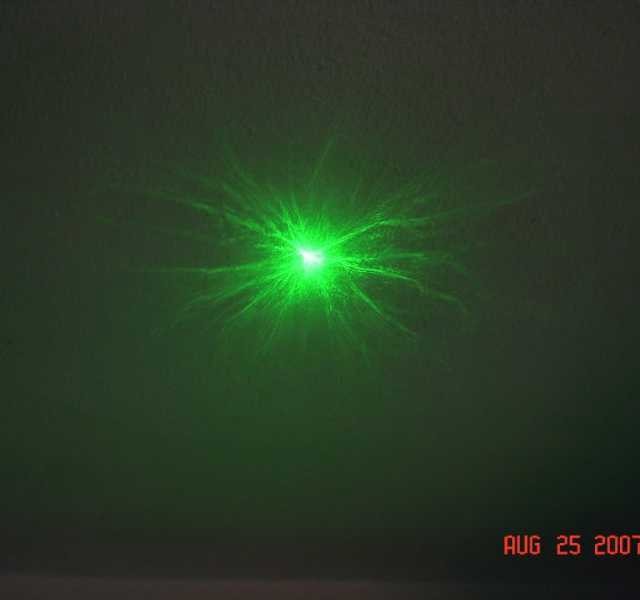
“Could it be that the meteor descending through the atmosphere, having passed through the ionosphere, actually created a transient conductive connection between the ionosphere and the ground, even if it was only for a few seconds? Was that enough to put charge into the ground, and then with the discharge form some kind of plasma ball above?”
— Queensland University of Technology astrophysicist Stephen Hughes asks probing questions about the not-well-understood phenomenon of “ball lightning,” which has been posited as an explanation for the numerous reports of green fireballs seen rolling around the mountains west of Brisbane, Australia in May, 2006. This while a meteor shower lit up the sky above. Hughes also told BBC news, “If you put together inexplicable atmospheric phenomena, maybe of an electrical nature, with human psychology and the desire to see something — that could explain a lot of these UFO sightings.”
And here is what ball lightning looks like traveling along power lines in Saudi Arabia.
Royce Mullins and The Case of Virtue's Burn, A Novel: Chapter 13
by Jeff Hart
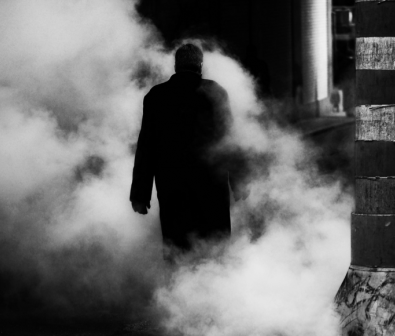
I poked my head out of a room that smelled of casual sex into a hallway where the prevailing odor was casual violence. It was the smell of spent adrenaline, the kind of butt-puckering pheromone warning that sent small animals scurrying back into the brush for cover. The top floor of the Unfettered Souls’ Wellness Center had witnessed the kind of primal discharge that Chief Motivationalist Wayne Maker dedicated books to suppressing. None of these men had paused to take a deep breath and count backwards from five.
Luckily, I’d been down the rabbit hole when the violence took place, working on a different sort of discharge.
I’d gotten to know Darlene, the unwitting soul mate of my client Paul Fennel, in ways both biblical and not. I’d used the fight in the hallway to scare her into agreeing to meet Fennel, and I’d lured the two marines on Fennel’s tail into combat with spiritual-enforcer Bo Harkins so that meeting could happen without murderous interruption. Everything was going to plan.
Except there was one body too few in the hallway.
“Where’s the other one?” I asked.
By way of reply, Bo Harkins punched the wall.
Harkins was still standing, but barely. He glared at me, his usual malice undermined by his tent-flap lower lip. It shuddered with every wet intake of breath, like a scraped-knee child expending great effort to be brave for his iodine-waving mother.
“Just him,” managed Harkins. “Alone.”
Harkins’ hands clenched and unclenched, short term muscle memory stuck in a loop of a few moments ago, when Harkins had wrapped his hands around Pilgrim’s throat and twisted. The marine was stretched out on the hallway floor in a pose similar to last night when he’d made himself comfortable on my futon. Except now Pilgrim’s Adam’s apple jutted out at an impossible angle, reminding me of a snake that’d gotten too ambitious with its prey. I looked into Pilgrim’s open, glassy eyes, one of them flooded with blood, and briefly considered my moral culpability in his demise. How responsible was I?
Not very, I decided. I was no more responsible for Pilgrim than I was for the combination of prayers and Chinese indifference that called down the trash comet that killed John the Bulldog. At least, that’s what I told myself. I felt a surge of relief looking at Pilgrim, tempered only by the wish that Yossarian was cooling on Unfettered carpet next to his tittering sidekick.
“Look at this,” groaned Harkins, and spun around to show me where Pilgrim’s butterfly knife hung, buried a couple inches into the meat between his shoulder blades. “He stuck me.”
Harkins hugged himself, his shaking hands ineffectually reaching for the handle of the knife. Pilgrim had found just the right spot, in backscratcher territory, where Harkins’ grasping fingers would never find the right angle.
“You want me to pull that out, Bo?”
“Well I don’t want you to just fucking stare at,” answered Harkins.
But then, Harkins remembered himself, realized that I wasn’t exactly a friend and certainly not a guy he wanted with one hand on the knife already in his back. He turned to face me, made an effort to straighten up. I noticed his lip had stopped shaking.
“Forget it,” said Harkins, sizing me up. “You’d probably just twist it.”
I was saved from having to mutter a half-hearted protest by Darlene emerging from her room. She’d traded the black robe of a Virtue for a hooded sweatshirt and tight jeans, the frumpy college girl look, far from the transcendental Helen that’d launched Paul Fennel’s doomed spiritual voyage. Nothing screamed destiny less than a hoodie. It was a good break-up outfit, the kind of ensemble that told a confused prophet that you weren’t his soul mate, that he’d read too much into the rash on his chest, that there were other souls in the sea.
“Holy shit,” she said, staring down at Pilgrim’s body. “I think I know this guy.”
Harkins lunged forward, grabbing me by the arm. He had the wild look of a man that wasn’t yet quite clear on the specifics, but still sensed that he’d been played.
“This some kind of set up, Royce?”
“We’re just going to take the air,” I replied. “I’ll bring her right back.”
“Uh-uh. That wasn’t the deal,” growled Harkins. His grip tightened on my arm, sending pins and needles through my shoulder, and causing me to involuntarily glance at Pilgrim’s body. “Neither of you is going anywhere until we sort this out.”
Without spending much time considering possible alternatives, I pepper-sprayed Harkins.
Having never been a specialist in protester disbursement, nor a damsel-in-distress navigating a dark alley, I’d never used the stuff before, but knew enough to turn my own head away, to hold my breath. Harkins fell to his knees, rubbing eyes already swollen, viciously coughing. A man in my profession knew this was the appropriate time for a quip but, as I opened my mouth to deliver a more metaphorical twisting of the knife, a swarm of invisible wasps with stingers dipped in cayenne overwhelmed me, and I started coughing too. From his front row seat in the afterlife, I imagined John the Bulldog about keeling over with laughter.
“Jesus,” said Darlene, shielding her face. “You just got me fired.”
Still coughing, I grabbed her by the hand and booked it toward the elevator.
I dragged her through the lobby, out the fire exit, and into the back alley where yesterday Bo Harkins had sucker-punched me. As threatened, Harkins had burned the trash. The alley still stunk of it, the more lethal Chinese equivalent of melted polystyrene not doing my raw lungs any favors.
Considering the circumstances, I was surprised to find myself smiling. If I hadn’t been coughing, I’d have been laughing too. An inexplicable giddiness had come over me — fleeing danger while holding the hand of a woman I was temporarily giving a shit about — it was a victorious feeling, something I wasn’t used to, a welcome change of pace. I felt Unfettered. I only reluctantly released Darlene’s hand when we made it to my car.
“Smells like shit in here,” said Darlene.
I grinned at her.
I drove us out of Midtown. I took a circuitous path through the busy streets, one eye pinned to my rearview for anything that might be a tail. If Yossarian was out there, following, he’d have needed a helicopter to keep track of my evasive maneuvers. Satisfied we weren’t being shadowed, I pulled the car over a block away from the Queensboro Bridge and asked to borrow Darlene’s cell phone.
“Royce,” answered Dot, on the first ring. “Are you alright?”
“How did you know?” I asked, referring to my tech-savvy colleague’s preternatural caller ID. “This is a new phone.”
“You’re the only one that calls this number,” she replied. “So, mystery solved.”
“Not yet, but it will be within the hour.”
“Where are you?”
“Doesn’t matter. It’s where I want to be tomorrow that’s important. Can you make arrangements to get me out of the city? Doesn’t matter where,” I paused, considering. “Me, and maybe two others.”
“Who are the others?”
“Maybe nobody,” I replied, glancing at Darlene who dully stared at the blinking lights of the Queensboro. “Or maybe two souls will bond and blah blah blah. Who knows. The night is young.”
“I can do that,” said Dot. “You sound different, Royce.”
“Like a changed man?”
“Like you’ve lost it.”
“No,” I said. “I’m winning it.”
I hung up.
We crossed the Queensboro in silence. It was only as we cruised the last few blocks toward Fennel’s Long Island City hideout that it occurred to me to ask how Darlene had known Pilgrim. She shrugged, apparently not feeling much sympathy for the dead marine.
“I don’t know,” she said, lighting a Newport. “I think he served with my brother.”
Jeff Hart lives in Brooklyn. His other writing can be found over at Culture Blues.
Photo by Fabio, from Flickr.
Biased Reporter Says Capuchin Monkeys Are The Best At Cracking Open Nuts
Discovery’s Jennifer Viegas writes a total puff piece about wild bearded capuchin monkeys, to whom she fawningly refers as “the real nut-cracking kings.” Apparently a team of scientists led by Qing Liu of the University of Georgia recently did some study or other of the way Brazilian capuchins make anvils out of logs and use stones as hammer to crack open palm nuts. This is apparently a big deal and Viegas thinks the monkeys are super-smart.
The researchers report that,
Capuchins are sensitive to certain properties of the pits they use in nut-cracking, preferring to use pits that require the fewest strikes to crack nuts. Capuchins assessed the effectiveness of the pits either by positioning the nut, using the nut as an extension of their hand, or by striking the nut with the stone, thereby indirectly gaining information about the pit.
Viegas is extremely impressed with this, the way monkeys used trial-and-error to hone their nut-cracking technique, learning things like the fact that the “fly-off rate was significantly higher in shallow pits than in medium pits.”
Yeah, well. You know who else is really awesome at opening nuts? Me, that’s who. You don’t have to tell me about nut positioning or fly-off rates. (A “fly-off” is when either nut or shell goes shooting off into the air.) Believe me, I know all about those kinds of things. I’m been opening nuts for years. Pistachios, mostly. And I like to think I’ve gotten pretty darn good at it. And without the use of any fancy or very simple “tools” either. No, I use nothing but my own fingers. And I’ve got the scars to prove it. Sure, mis-cracks and fly-offs happen to the best of us, human or monkey. I’ve lost many perfectly edible nuts in my time, under the oven, or down the space between the counter and the stove-top. I won’t deny it.
But I will say this, here and now: I challenge any wild bearded capuchin monkey to successfully open more pistachio nuts in a shorter amount of time than me. Any day they want to try it. We can do it right in my kitchen. They can sit right up on the counter, next to the fridge, as long as they don’t poop everywhere. We can get someone with a stop-watch and one of those little hand-clickers to be a judge. As long as its a neutral party, who won’t, like, count partially cracked shells as fully opened for the monkeys just because the monkeys are just monkeys and so AMAZING and humanlike at using their tools and everything. As long as everything’s on the up and up, I like my chances against anyone. Or any monkey. We’ll see who’s the real nut-cracking king.
You tell your capuchin pals, Jennifer Viegas. Tell them to bring their stone hammers, too. And their scientifically-chosen, custom-pitted wooden anvils. They’re gonna need ‘em.
A Long Time Ago There Was A Show Called "Twin Peaks"
Remember “Twin Peaks”? That show was so very awesome. Or at least the first season was. It went off the rails a bit toward the end. Anyway, read this.
Let's Drink Some Port!
Not that you need any excuse to have a glass, but this article is a good reminder that we are not drinking enough port. Get yourself a bottle on the way home. Doesn’t matter what kind. Also pick up a wedge of Stilton and a box of Jules Destrooper Ginger Thins. It will not be a nutritious dinner, but it will be a delightful one. Plus, you will probably become drunk. And on a day like today, that’s all that matters.
